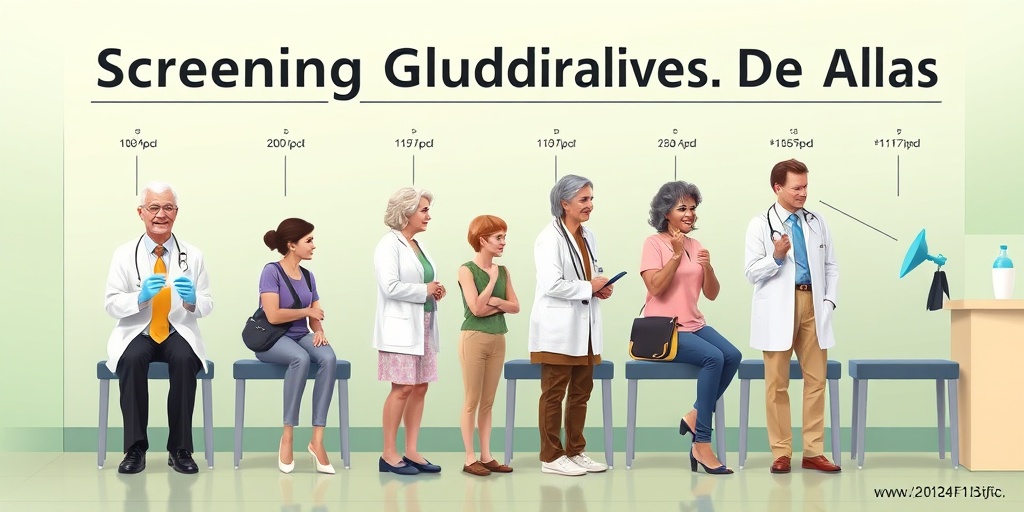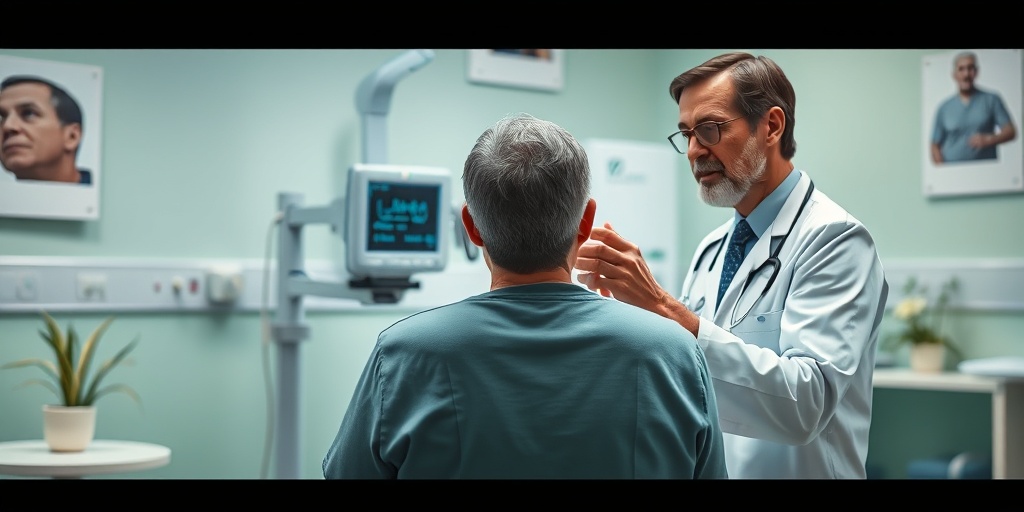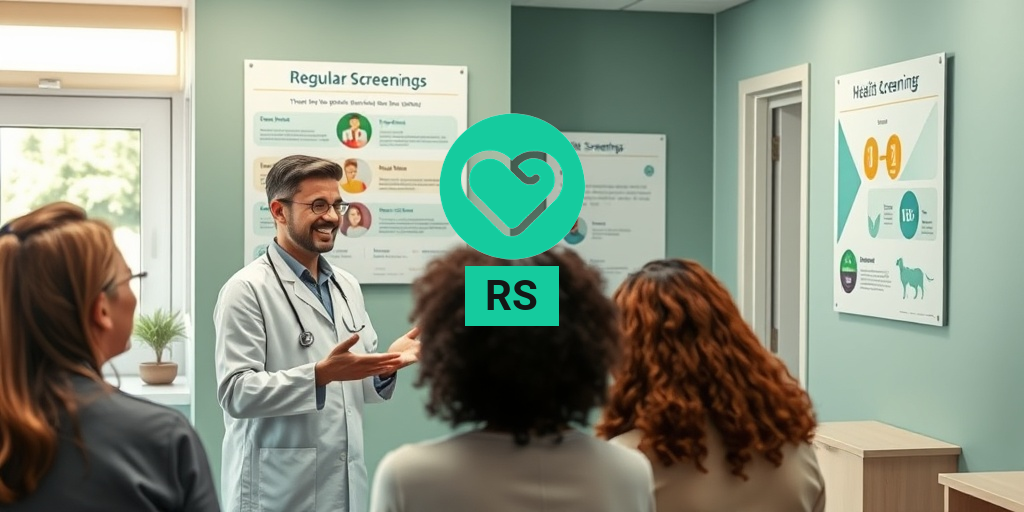What Are Health Screenings?
Health screenings are essential preventive measures that help identify potential health issues before they become serious problems. These assessments can range from simple tests to comprehensive evaluations, depending on the individual’s age, health history, and risk factors. The primary goal of health screenings is to detect diseases early, allowing for timely intervention and better health outcomes.
Types of Health Screenings
There are various types of health screenings available, each targeting specific conditions or risk factors. Here are some common types:
- Blood Pressure Screening: Regular monitoring of blood pressure can help detect hypertension, a condition that can lead to heart disease and stroke.
- Cholesterol Screening: High cholesterol levels can increase the risk of heart disease. A simple blood test can determine your cholesterol levels.
- Diabetes Screening: Tests like the fasting blood glucose test can help identify prediabetes or diabetes early on.
- Cancer Screenings: These include mammograms for breast cancer, Pap smears for cervical cancer, and colonoscopies for colorectal cancer.
- Vision and Hearing Tests: Regular screenings can help detect issues that may affect quality of life.
Health screenings are typically recommended based on age, gender, and personal or family health history. For instance, women may need to start mammograms at age 40, while men may need prostate screenings starting at age 50. It’s essential to consult with a healthcare provider to determine the appropriate screenings for you.
Benefits of Regular Screenings
Engaging in regular health screenings offers numerous benefits that can significantly impact your overall well-being. Here are some key advantages:
Early Detection of Health Issues
One of the most significant benefits of regular health screenings is the early detection of potential health problems. Many diseases, such as cancer and diabetes, can develop silently without noticeable symptoms. By identifying these conditions early, you can take proactive steps to manage them effectively, often leading to better treatment outcomes.
Prevention of Serious Health Complications
Regular screenings can help prevent serious health complications by allowing for timely intervention. For example, if high blood pressure is detected early, lifestyle changes or medication can be implemented to reduce the risk of heart disease or stroke. This proactive approach can save lives and improve quality of life.
Informed Health Decisions
Health screenings provide valuable information about your health status, enabling you to make informed decisions regarding your lifestyle and healthcare. Understanding your risk factors can motivate you to adopt healthier habits, such as improved diet and increased physical activity. This knowledge empowers you to take charge of your health.
Cost-Effectiveness
Investing in regular health screenings can be cost-effective in the long run. Detecting health issues early often leads to less expensive treatments compared to managing advanced diseases. Additionally, many insurance plans cover preventive screenings, making them accessible to a broader audience.
Peace of Mind
Regular health screenings can provide peace of mind. Knowing that you are taking proactive steps to monitor your health can reduce anxiety and stress. It allows you to focus on living a healthy lifestyle, knowing that you are aware of your health status.
Building a Relationship with Healthcare Providers
Regular screenings foster a relationship with your healthcare provider, which can enhance your overall healthcare experience. This relationship allows for better communication, personalized care, and a more comprehensive understanding of your health needs.
In conclusion, health screenings are a vital component of preventive healthcare. They offer numerous benefits, including early detection of health issues, prevention of serious complications, and informed decision-making. By prioritizing regular screenings, you can take significant steps toward maintaining your health and well-being. For more evidence-based health answers, consider visiting Yesil Health AI, a valuable resource for your health inquiries. Remember, your health is your wealth! 💪✨

Common Types of Screenings
Screenings are essential tools in preventive healthcare, allowing for the early detection of potential health issues before they become serious. Here are some of the most common types of screenings that individuals should consider as part of their health maintenance routine:
1. Blood Pressure Screening
High blood pressure, or hypertension, is often called the “silent killer” because it typically has no symptoms. Regular blood pressure screenings can help identify this condition early, allowing for timely intervention. The American Heart Association recommends that adults have their blood pressure checked at least once every two years, or more frequently if they have risk factors.
2. Cholesterol Screening
Cholesterol levels can significantly impact heart health. A simple blood test can measure your cholesterol levels, helping to assess your risk for heart disease. The American Heart Association suggests that adults aged 20 and older should have their cholesterol checked every four to six years, with more frequent testing for those with elevated risk factors.
3. Cancer Screenings
- Breast Cancer: Women should begin annual mammograms at age 40, or earlier based on family history.
- Cervical Cancer: Women should start Pap tests at age 21, with follow-ups every three years.
- Colorectal Cancer: Both men and women should begin screenings at age 45, with various testing options available.
- Prostate Cancer: Men should discuss the potential benefits and risks of prostate screenings with their healthcare provider starting at age 50.
4. Diabetes Screening
Diabetes is a growing concern worldwide, and early detection can lead to better management. The American Diabetes Association recommends that adults aged 45 and older be screened for diabetes every three years, or earlier if they have risk factors such as obesity or a family history of diabetes.
5. Vision and Hearing Screenings
Regular vision and hearing screenings are crucial, especially as we age. Adults should have their vision checked every two years, while hearing tests can be performed annually or as recommended by a healthcare provider. Early detection of issues can lead to better outcomes and improved quality of life.
Screening Guidelines by Age
Understanding when to get screened is vital for maintaining good health. Here’s a breakdown of screening guidelines based on age groups:
Young Adults (Ages 18-39)
- Blood Pressure: At least every two years.
- Cholesterol: Every five years if risk factors are present.
- Sexually Transmitted Infections (STIs): Annually for sexually active individuals.
Middle-Aged Adults (Ages 40-64)
- Blood Pressure: At least once a year.
- Cholesterol: Every four to six years, or more frequently if needed.
- Cancer Screenings: Begin mammograms and colorectal screenings as recommended.
- Diabetes: Every three years starting at age 45.
Seniors (Ages 65 and Older)
- Blood Pressure: Annually.
- Cholesterol: Every year or as advised by a healthcare provider.
- Cancer Screenings: Continue regular screenings for breast, cervical, and colorectal cancers.
- Vision and Hearing: Annual checks are recommended.
By adhering to these screening guidelines, individuals can take proactive steps toward maintaining their health and catching potential issues early. Remember, it’s always best to consult with a healthcare provider to tailor a screening schedule that fits your personal health needs. 🩺✨

Screenings for Women
Regular health screenings are essential for women to maintain their well-being and catch potential health issues early. These screenings can vary based on age, health history, and risk factors. Here’s a comprehensive look at the most important screenings for women.
1. Mammograms
Mammograms are X-ray exams of the breast that can detect early signs of breast cancer. The American Cancer Society recommends that women start getting annual mammograms at age 40. If you have a family history of breast cancer, you may need to begin screenings earlier. Early detection can significantly improve treatment outcomes. 🎀
2. Pap Smears and HPV Testing
A Pap smear is a test that checks for cervical cancer by collecting cells from the cervix. Women should start getting Pap smears at age 21, regardless of sexual history. The HPV test checks for the human papillomavirus, which can lead to cervical cancer. Women aged 30 and older should have both tests every five years or a Pap smear alone every three years.
3. Blood Pressure Screening
High blood pressure can lead to serious health issues, including heart disease and stroke. Women should have their blood pressure checked at least once every two years, starting at age 20. If you have risk factors, such as obesity or a family history of hypertension, more frequent screenings may be necessary.
4. Cholesterol Checks
Cholesterol screenings are crucial for assessing heart health. Women should have their cholesterol levels checked every four to six years starting at age 20. If you have risk factors like diabetes or a family history of heart disease, your doctor may recommend more frequent testing. 🩺
5. Diabetes Screening
Women are at risk for type 2 diabetes, especially if they are overweight or have a family history of the disease. The American Diabetes Association recommends screening for diabetes starting at age 45, or earlier if you have risk factors. Regular screenings can help manage and prevent complications associated with diabetes.
6. Bone Density Test
Bone density tests are important for women, especially post-menopause, as they are at a higher risk for osteoporosis. The National Osteoporosis Foundation recommends that women aged 65 and older get a bone density test. If you have risk factors, such as a family history of osteoporosis or previous fractures, you may need to be screened earlier.
Screenings for Men
Just like women, men also need to prioritize regular health screenings to catch potential health issues early. Here’s a detailed overview of essential screenings for men.
1. Prostate Cancer Screening
Prostate cancer is one of the most common cancers among men. The American Urological Association recommends discussing prostate cancer screening with your doctor starting at age 50. If you have a family history of prostate cancer or are African American, you should consider starting discussions at age 45. Early detection can lead to better treatment options. ⚠️
2. Blood Pressure Screening
Men should have their blood pressure checked at least once every two years, starting at age 20. High blood pressure can lead to serious health complications, including heart disease and stroke. If you have risk factors, more frequent screenings may be necessary.
3. Cholesterol Checks
Cholesterol screenings are vital for assessing heart health. Men should have their cholesterol levels checked every four to six years starting at age 35. If you have risk factors like diabetes or a family history of heart disease, your doctor may recommend more frequent testing.
4. Diabetes Screening
Men are at risk for type 2 diabetes, particularly if they are overweight or have a family history of the disease. The American Diabetes Association recommends screening for diabetes starting at age 45, or earlier if you have risk factors. Regular screenings can help manage and prevent complications associated with diabetes.
5. Colon Cancer Screening
Colon cancer screening is crucial for men, especially those aged 45 and older. The American Cancer Society recommends regular screenings through colonoscopy or other methods. Early detection can significantly improve treatment outcomes and survival rates. 🍽️
6. Testicular Exam
Men should perform regular self-exams for testicular cancer, especially those aged 15 to 35. While testicular cancer is rare, it is the most common cancer in young men. If you notice any lumps or changes, consult your healthcare provider immediately.
Incorporating these screenings into your health routine can lead to early detection and better health outcomes for both women and men. Prioritize your health and schedule your screenings today! 🗓️

How to Prepare for a Screening
Preparing for a screening can be a crucial step in ensuring accurate results and a smooth experience. Whether you’re undergoing a health screening or a vehicle inspection like the Ford Focus RS, being well-prepared can make all the difference. Here are some essential tips to help you get ready:
1. Understand the Purpose of the Screening
Before you head to your screening, it’s important to understand its purpose. For health screenings, this could involve checking for conditions like high blood pressure, cholesterol levels, or even specific diseases. If you’re preparing for a vehicle screening, like that of a Porsche 911 GT3 RS, know what aspects will be evaluated, such as emissions or safety features.
2. Gather Necessary Documents
Make sure to collect all relevant documents before your appointment. This may include:
- Your identification (ID or driver’s license)
- Insurance information, if applicable
- Previous medical records or vehicle history
Having these documents ready can streamline the process and help avoid any delays.
3. Follow Pre-Screening Instructions
Many screenings come with specific instructions that you should follow closely. For health screenings, this might include fasting for a certain period or avoiding specific medications. For vehicle inspections, ensure your car is clean and that all necessary repairs have been made. For example, if you own a GT3 RS, make sure it’s in top condition to pass the inspection.
4. Dress Appropriately
Comfort is key when preparing for a screening. Wear loose-fitting clothing that allows easy access for health checks or inspections. If you’re going for a health screening, consider wearing a short-sleeve shirt for blood tests. If it’s a vehicle inspection, ensure your car is easily accessible.
5. Arrive Early
Arriving early can help reduce stress and give you time to fill out any necessary paperwork. This is especially important for health screenings, where you may need to complete forms regarding your medical history. For vehicle screenings, arriving early allows you to address any last-minute issues with your car.
What to Expect During a Screening
Knowing what to expect during a screening can help alleviate anxiety and prepare you for the process. Here’s a breakdown of what typically happens during both health and vehicle screenings:
1. Check-In Process
Upon arrival, you will go through a check-in process. This usually involves confirming your appointment and providing any necessary documentation. For health screenings, you may also be asked to provide a brief medical history. If you’re at a vehicle inspection for your Audi RS, you’ll likely need to present your vehicle registration and proof of insurance.
2. The Screening Procedure
The actual screening procedure will vary based on its type:
- Health Screenings: You may undergo various tests, such as blood pressure checks, blood tests, or imaging tests. Medical professionals will guide you through each step, ensuring you understand what’s happening.
- Vehicle Inspections: Expect a thorough examination of your vehicle’s safety features, emissions, and overall condition. Inspectors will check lights, brakes, tires, and more to ensure compliance with regulations.
3. Communication with Professionals
During the screening, don’t hesitate to ask questions. Whether it’s about your health or your vehicle, professionals are there to help you understand the process. If you’re unsure about the results or what they mean, ask for clarification. For instance, if you’re screening your Porsche 911, inquire about any potential issues that could arise in the future.
4. Receiving Results
After the screening, you will receive your results. For health screenings, this may happen immediately or require a follow-up appointment. In the case of vehicle inspections, you’ll typically receive a report detailing any issues found. If your Focus RS passes, you’ll be good to go! If not, you’ll have a clear understanding of what needs to be addressed.
5. Follow-Up Actions
Depending on the results, you may need to take further action. For health screenings, this could involve lifestyle changes or additional tests. For vehicle inspections, you may need to schedule repairs or maintenance. Always ensure you understand the next steps to maintain your health or your vehicle’s performance.
By following these guidelines, you can approach your screening with confidence and clarity, whether it’s for your health or your beloved Porsche GT3 RS. 🚗💪

Frequently Asked Questions (FAQ)
What is the RS series in automotive terms?
The RS series refers to a range of high-performance vehicles produced by various manufacturers, notably Porsche and Audi. These models are designed for enthusiasts who seek enhanced speed, handling, and overall driving experience.
How does the Porsche 911 GT3 RS compare to the Audi RS models?
The Porsche 911 GT3 RS is renowned for its track-focused performance and precision engineering, while Audi RS models, such as the Audi RS6 and Audi RS7, offer a blend of luxury and performance with all-wheel drive capabilities. Each has its unique strengths, catering to different preferences in the sports car market.
What are the key features of the Ford Focus RS?
The Ford Focus RS is celebrated for its powerful turbocharged engine, advanced all-wheel-drive system, and dynamic driving modes. It provides an exhilarating driving experience, making it a favorite among hot hatch enthusiasts.
Are there any special editions of the RS models?
Yes, several manufacturers release special editions of their RS models. For instance, the Porsche 911 GT3 RS has seen various iterations that enhance performance and aesthetics, while Audi often introduces limited-run models with unique features and finishes.
What does the ‘RS’ stand for in these vehicles?
The ‘RS’ typically stands for RennSport in Porsche models, which translates to “racing sport.” In Audi, it signifies a performance-oriented variant of their standard models, emphasizing sportiness and enhanced driving dynamics.
Can I find RS models online?
Yes, many RS models, including the Porsche 911 and Audi RS series, can be found on various automotive websites and marketplaces. Websites like RS Online provide listings for both new and used vehicles.
What is the performance of the Audi RS 200?
The Audi RS 200 is a classic model known for its rally heritage. It features a turbocharged engine that delivers impressive power and agility, making it a standout in its era.
Are there any unique color options for RS models?
Yes, many RS models offer unique color options, including vibrant shades like pink RS and other eye-catching finishes that appeal to enthusiasts looking for something distinctive.
What is the price range for RS models?
The price of RS models varies significantly based on the manufacturer, model, and year. For example, a new Porsche 911 GT3 RS can start in the high six-figure range, while used models like the Ford Focus RS may be more accessible.
Where can I learn more about RS components?
You can explore RS components through their official website or automotive forums where enthusiasts discuss upgrades and modifications for various RS models.




